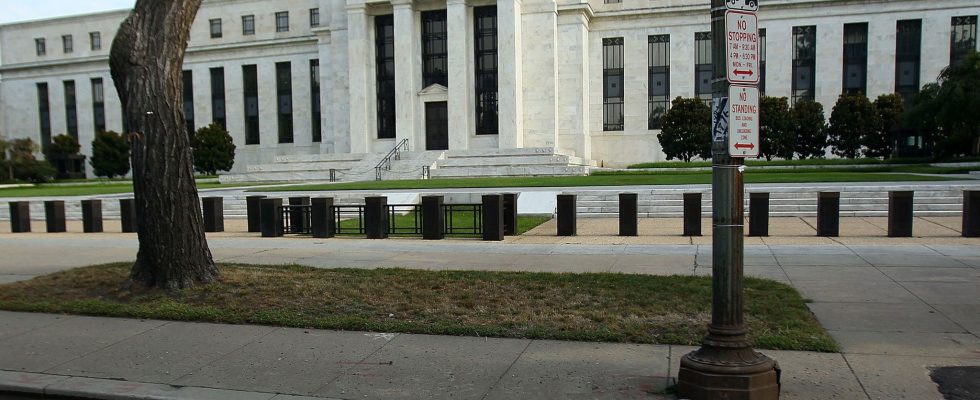These are measures taken jointly by Treasury Secretary Janet Yellen, the Fed and the Deposit Guarantee Agency (FDIC), after consultation with US President Joe Biden. The American authorities announced on Sunday March 12 a series of measures to reassure individuals and businesses about the solidity of the American banking system.
They will in particular guarantee the withdrawal of all the deposits of the bankrupt bank Silicon Valley Bank (SVB). In addition to SVB, they will allow access to all the deposits of another establishment, Signature Bank, which was automatically closed by the regulator, to everyone’s surprise, according to a press release. The Federal Reserve (Fed) – the US central bank – has also agreed to lend the necessary funds to other banks that need them to honor withdrawal requests from their customers.
“Today, we are taking decisive action to protect the US economy by strengthening confidence in our banking system,” the Fed, Treasury and FDIC said in their statement. “This initiative will allow the US banking system to continue to play its vital role of protecting deposits and providing access to credit for households and businesses,” they continued.
The day after the announcement of the response from the American authorities, the British branch of the bankrupt Californian bank SVB was sold to HSBC, a sale “facilitated” by the British government and the Bank of England, announced on Monday 13 March the British Treasury. “Silicon Valley Bank (UK) was sold today to HSBC. (…) SVB UK customers will be able to access their deposits and banking services as normal from today,” the Treasury wrote in a statement.
The failure of three banks
The whole system testifies to the turbulence that threatens the American banking system, disturbed by the forced monetary tightening of the Fed. It has put pressure on bank margins, encouraged customers to invest their money in financial products that pay better than current accounts and has shaken up the cash-hungry new technology sector.
The wave of withdrawals that followed caused the default of three banks this week, namely SVB, Signature Bank but also Silvergate Bank, smaller but known for its privileged links with the cryptocurrency community. The New York-based Signature Bank is the 21st American bank, with assets estimated by the Fed at 110 billion dollars, at the end of 2022. Its failure is the third largest in the history of the United States, behind SVB and Washington Mutual, in 2008.
After the announcement of the FDIC takeover of SVB on Friday, March 10, many had worried about the fate of deposits blocked by the establishment’s default. Some 96% of them were, in fact, not covered by the traditional guarantee of deposits, which provides up to 250,000 dollars per customer and per bank.
“The banking system is much more resilient and has a much better foundation than before the financial crisis,” hammered a Treasury official. “To be clear, the situation is not like 2008.” “The Fed’s actions this weekend are intended to end the disruptions in the banking sector and the financial system that had manifested rapidly in recent days,” said a Fed official. All of the measures unveiled on Sunday were “necessary to address the systemic risk that we have observed in the financial markets”, he said.
The solution announced on Sunday protects depositors but “the investors (shareholders) of these two banks (SVB and Signature Bank) will lose everything” and their leaders will be replaced, said this Fed official.
Joe Biden wants to “hold to account”
“I am firmly determined to hold accountable those responsible for this mess,” Joe Biden said in a statement. The American president assured that “the American people and American businesses can be confident that their bank deposits will be there when they need them”. He is due to speak on Monday on “how we will maintain a resilient banking system to protect our historic economic recovery,” he said.
At the same time, the American authorities put SVB up for auction with the aim of finding a buyer as soon as possible. The race against time initiated by the American authorities recalls the weekend of September 13 and 14, 2008. They had then failed to find a buyer for the bank Lehman Brothers and refused to intervene, pushing it to file for bankruptcy on Monday, with dramatic consequences for the financial sector and the economy as a whole.
In addition to the stability of the banking system, many expressed concern about the repercussions of the SVB bankruptcy on the technology sector, American but also beyond. SVB boasted of having “nearly half” of technology and life sciences companies financed by American investors.
SVB deposits amounted to around $170 billion, according to a document released Wednesday by the establishment, but colossal withdrawals have taken place since. “A lot of depositors are small businesses that need to be able to access their funds to pay their bills and they employ tens of thousands of people” in the United States, Janet Yellen noted on Sunday on the CBS channel. Janet Yellen ruled out a bailout of SVB on Sunday via an injection of public money.
